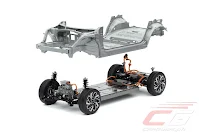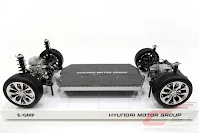Hyundai Motor Group, the parent company of Hyundai and Kia has shown off its all-new dedicated battery electric vehicle (BEV) platform called the Electric-Global Modular Platform or E-GMP. Serving as the core technology of Hyundai and Kia’s next-generation electric vehicle line-up, it will be used for the first time in the upcoming 2021 Ioniq 5.
Designed exclusively for BEVs, E-GMP provides various advantages compared to the Group’s existing platforms, which have each been engineered predominantly to accommodate internal combustion engines. Benefits include increased development flexibility, powerful driving performance, increased driving range, strengthened safety features, and more interior space for occupants and luggage.
E-GMP reduces complexity through modularization and standardization, allowing rapid and flexible development of products which can be used across most vehicle segments, such as sedans, SUVs, and crossovers. Moreover, flexible development can satisfy various customer needs for vehicle performance. Among these, a high-performance model will accelerate from 0-100 km/h in less than 3.5 seconds and achieve a maximum speed of 260 km/h.
The platform is engineered to offer improved cornering performance and driving stability at high speed. This is due to optimal weight distribution between front and rear, a design which enables a low center of gravity thanks to its low-mounted battery pack, and the adoption of electric motors located in the space previously occupied by an engine.
The high-speed electric motor raises the driving performance of E-GMP vehicles. A five-link rear suspension system, which is typically used for mid and large sized vehicle segments, and the world’s first mass-produced integrated drive axle (IDA), which combines wheel bearings with the drive shaft to transmit power to the wheels, enhance ride comfort and handling stability.
The platform secures battery safety through a battery support structure made of ultra-high strength steel. Hot-stamped steel components surround this structure for additional rigidity. Collision energy can be absorbed efficiently thanks to energy-absorbent sections of the body and chassis, effective energy load paths, and a central section of the battery pack tightly bound to the vehicle body.
E-GMP maximizes interior space through its long wheelbase, short front and rear overhangs and slim cockpit module. With the battery pack mounted beneath the floor, the E-GMP creates a flat floor for the cabin. This provides more legroom for passengers, while enabling various arrangements for the front and rear seats.
The battery pack itself, mounted between the front and rear wheel axles, will be the most power-dense system that Hyundai Motor Group has ever created. This is partly thanks to its enhanced cooling performance, a result of a new separate cooling block structure which helps make the battery pack more compact. With energy density enhanced by around 10 percent compared to existing EV battery technology, the battery packs are lighter, can be mounted lower in the body, and liberate more cabin space.
The E-GMP relies on the rear wheel for propulsion. Customers will be able to choose between rear-wheel and all-wheel drive configurations; models with the latter can be equipped with an additional motor. The all-wheel drive system includes an EV transmission disconnector, which can control the connection between the additional motor and front wheels, and switch between two-wheel and all-wheel drive modes to enhance efficiency by offering the ideal level of power or performance for current driving conditions.
A BEV based on E-GMP is capable of a maximum range of over 500 kilometers with a fully charged battery, according to the Worldwide Harmonized Light-duty vehicle Procedure (WLTP). Moreover, it can high-speed charge up to 80 percent in just 18 minutes and can add up to 100 kilometers of driving range in just five minutes.
The E-GMP will underpin Hyundai Motor Group’s plans to introduce a total of 23 BEV models including 11 dedicated BEV models, and sell more than 1 million BEVs worldwide by 2025. As part of its BEV vision, Hyundai Motor Company launched its dedicated ‘Ioniq’ BEV brand in August 2020, which includes three dedicated BEV models, the Ioniq 5,6, and 7 by 2024. This currently covers various vehicle segments.
Kia is also undergoing a transformation for the era of electrification, based on its ‘Plan S’ mid-to-long term strategy. In September, Kia announced plans to increase the share of BEV sales volumes as a proportion of total sales to 20 percent by 2025. The company also recently published an early image of seven dedicated BEV models to be released sequentially by 2027.








No comments:
Post a Comment
Feel free to comment or share your views. Comments that are derogatory and/or spam will not be tolerated. We reserve the right to moderate and/or remove comments.